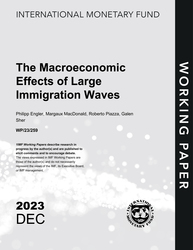
The Macroeconomic Effects of Large Immigration Waves
The Macroeconomic Effects of Large Immigration Waves
READ MORE...
Volume/Issue:
Volume 2023
Issue 259
Publication date: December 2023
ISBN: 9798400261794
$20.00
Add to Cart by clicking price of the language and format you'd like to purchase
Available Languages and Formats
| English |
Prices in red indicate formats that are not yet available but are forthcoming.
Topics covered in this book
This title contains information about the following subjects.
Click on a subject if you would like to see other titles with the same subjects.
Labor , Economics- Macroeconomics , Economics / General , Demography , Emigration and Immigration , Immigration , productivity , dynamic gains , immigration wave , immigration shock , immigration episode , OECD migration flow data , migration shock , Migration , Employment , Total factor productivity , Estimation techniques , Middle East
Summary
We propose a novel approach to measure the dynamic macroeconomic effects of immigration on the destination country, combining the analysis of episodes of large immigration waves with instrumental variables techniques. We distinguish the impact of immigration shocks in OECD countries from that of refugee immigration in emerging and developing economies. In OECD, large immigration waves raise domestic output and productivity in both the short and the medium term, pointing to significant dynamic gains for the host economy. We find no evidence of negative effects on aggregate employment of the native-born population. In contrast, our analysis of large refugee flows into emerging and developing countries does not find clear evidence of macroeconomic effects on the host country, a conclusion in line with a growing body of evidence that refugee immigrants are at disadvantage compared to other type of immigrants.
Copyright © 2010 - 2026
Powered by:
AIDC



